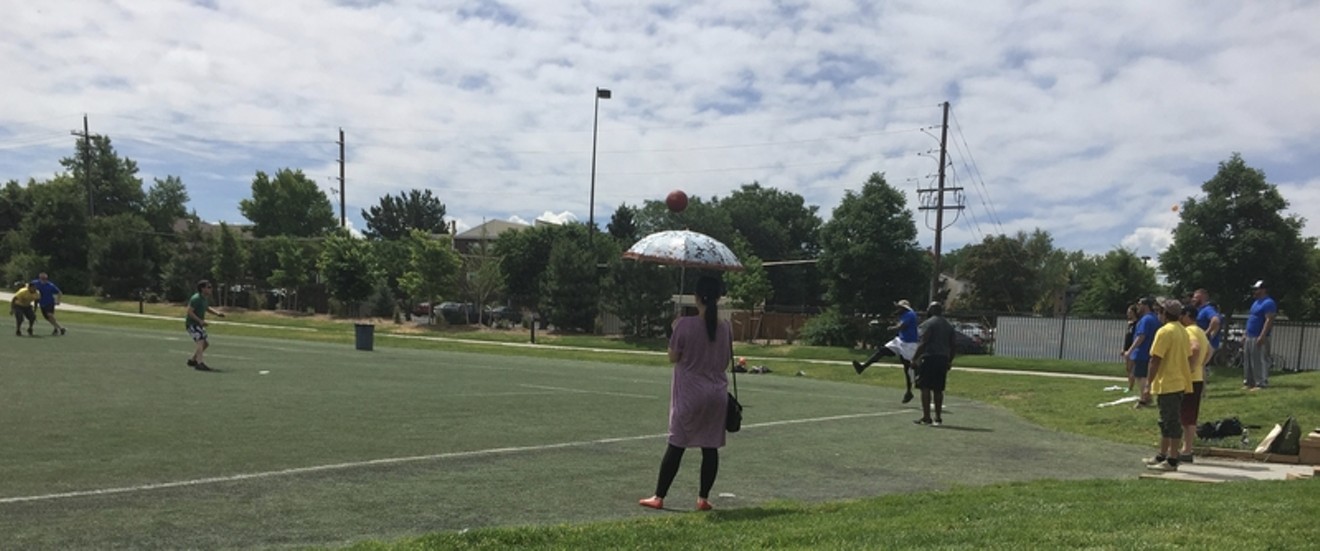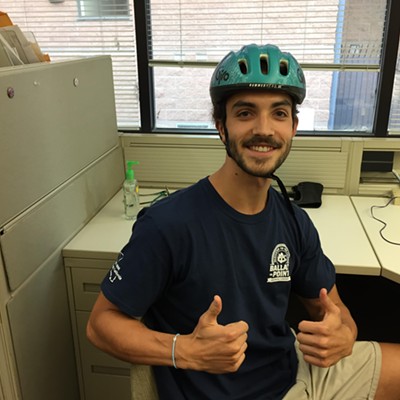Former NFL running back Reuben Droughns spent eight years avoiding tackles from some of the strongest, meanest men in sports. But on Saturday, June 25, hits were exactly what he was looking for. "We are here to win," he said to his teammates before playing kickball at the 4/20 Games. "And after that, smoke a couple joints!”
The 4/20 Games at Infinity Park, an annual event to raise money and awareness for cannabis-infused healthy living, were in full swing by mid-morning on Saturday. The event's second go-round in Denver aimed to combat the plant’s stigma by promoting an active and healthy cannabis lifestyle, partnering with Athletes for Care, or A4C — a nonprofit simultaneously raising awareness about health issues faced by professional athletes, de-stigmatizing cannabis use and helping retired jocks transition into new lives.
To those ends, Droughns and fellow former Denver Broncos Orlando Franklin, Tatum Bell and Charlie Adams were in attendance, raising money for the nonprofit by playing kickball and taking pictures with fans.
According to Athletes for Care co-founder Ryan Kingsbury, the nonprofit was formed in the wake of a campaign called “When the Bright Lights Fade,” which was launched to raise funds for studies examining how CBD could help treat and prevent chronic traumatic encephalopathy (CTE); Bell, Droughns and Adams were all featured in the campaign’s video.
Kingsbury was involved in the campaign via CBD company Charlotte’s Web, his employer at the time. "There were a lot of athletes struggling in life after their career in sports," Kingsbury said. "And it was really a lot of these athletes who wanted to do something to help. So we created Athletes for Care."
“As an organization, our mission is to create a community of these athletes to provide support, opportunity and purpose to one another in life after a career in sports. A big part of that is the cannabis component. A lot of these guys have been using opioids, or were throughout their career, and just found more relief through cannabis,” Kingsbury added.
Droughns acknowledges that he was one of those players, which is why he was booting kickballs on Saturday. “I had some troubles. Especially in my playing days — I had a lot of troubles with opioids," he said.
The former running back believes cannabis is a healthier alternative; he hopes efforts like his will spur the NFL into changing its drug policy to allow players to use medical marijuana. For retired players, lingering opioid addictions can exacerbate what is already a difficult change, according to Droughns. “Pain, mental problems, depression — all of those things took a hold of me,” he remembered. The eight-year NFL veteran uses cannabis and CBD almost daily, taking advantage of Athletes for Care's support network and advocacy opportunities to gain a stronger sense of purpose.
He thinks cannabis products can be especially effective in addressing the aftermath of repeated concussions, as well. “It keeps you relaxed, keeps you level-headed. If you’re depressed, it helps out. It just relaxes you, gets your mind off of things,” he added. “I’m sure anybody you talk to that’s an ex-football player has some sort of [concussion-related] problems going on.”
Droughns said he is far from an anomaly among ex-athletes, explaining that a fair amount of football players use cannabis, but do so surreptitiously out of fear of losing their jobs. Unfortunately, data on how cannabis treats CTE is very scarce, but A4C members, many of whom are former football players, are trying to persuade the NFL to change. Droughns thinks the league is about three to five years away from reforming its cannabis policy, which could go a long way in helping fill that data gap.
As is, players are wary of admitting that they use the plant, even in retirement. Of the four players present, only Droughns was willing to speak about it. Adams, Bell and Franklin had no interest in speaking on any ties to cannabis; Kingsbury explained that even ex-players are still concerned about how cannabis could affect their image and bring on potential NFL repercussions, as some of these retired players remain on NFL health insurance.
"My deal is trying to get as many athletes involved as possible, especially ex-NFL players [and] things of that nature," Droughns concluded. "The more we speak out about it, the quicker it’s going to become legal in the NFL.”
[
{
"name": "Air - MediumRectangle - Inline Content - Mobile Display Size",
"component": "12017618",
"insertPoint": "2",
"requiredCountToDisplay": "2"
},{
"name": "Editor Picks",
"component": "17242653",
"insertPoint": "4",
"requiredCountToDisplay": "1"
},{
"name": "Inline Links",
"component": "18838239",
"insertPoint": "8th",
"startingPoint": 8,
"requiredCountToDisplay": "7",
"maxInsertions": 25
},{
"name": "Air - MediumRectangle - Combo - Inline Content",
"component": "17261320",
"insertPoint": "8th",
"startingPoint": 8,
"requiredCountToDisplay": "7",
"maxInsertions": 25
},{
"name": "Inline Links",
"component": "18838239",
"insertPoint": "8th",
"startingPoint": 12,
"requiredCountToDisplay": "11",
"maxInsertions": 25
},{
"name": "Air - Leaderboard Tower - Combo - Inline Content",
"component": "17261321",
"insertPoint": "8th",
"startingPoint": 12,
"requiredCountToDisplay": "11",
"maxInsertions": 25
}
]












